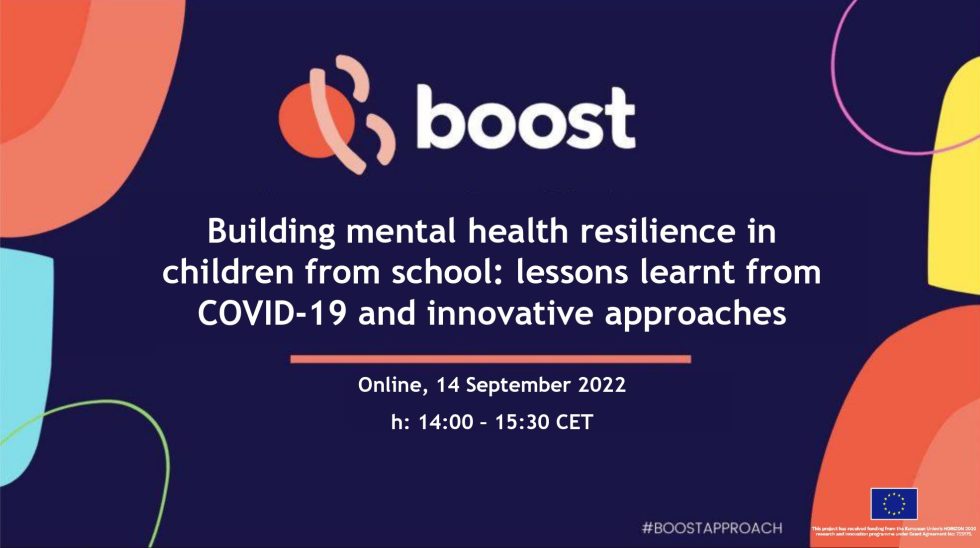
On 14 September 2022, the BOOST project organized a webinar entitled “Building mental health resilience in children from school: lessons learnt from COVID-19 and innovative approaches”. This virtual event was an occasion to present the state of the art, the latest results, and data evidence collected by the BOOST project concerning the impact of COVID-19 on the school environment over the past two years in the three countries involved (Spain, Norway, and Poland).
The event was opened by a keynote video message from Ms. Alviina Alametsä, Member of the European Parliament and Co-Chair of the Coalition for Mental Health and Wellbeing in the European Parliament. After a broad overview of the impact of COVID-19 on children’s mental health in the EU, Ms. Alametsä highlighted the importance of embedding Social and Emotional Learning in educational programs. She closed her speech by expressing the need to better connect and sensitize policymakers from the local to the European level, as well as the need for more investments to address mental health challenges now and in the future.
Stine Hellum Braathen, BOOST Scientific Coordinator from SINTEF, opened the session dedicated to project updates by presenting the latest steps in developing and adapting the BOOST approach to schools’ responses and new circumstances over the past two years. She stressed how evidence shows that working with SEL in children can have long-term positive effects, for example, making children more susceptible to learning. The SEL programs should be based on a bottom-up approach, implemented by all school staff; it’s promotive, preventive, flexible, and involves students and parents with continuous training for school staff. Thanks to the contributions from the three research partners (UNICO, SINTEF, and AWF), the webinar deep-dived into the impact on the school ecosystem in the three countries involved from both quantitative and qualitative perspectives. Data showed how the quarantine affected children’s mental health, highlighting common points within the three experiences, like the need for more training for staff and schoolteachers on emotional and mental skills, and more integration between mental health and policies.
The panel debate was a great moment of reflection on priorities and strategies for promoting children’s mental well-being in Europe, with a close eye on the role of schools in addressing this challenge, and to discuss how the BOOST project results can contribute to shaping future approaches. Prof. Simoes from the University of Lisbon shared the key takeaways from the NESET report “A systemic, whole-school approach to mental health and well-being in schools in the EU“, and encouraged the inclusion of SEL objectives in the curricula with academic achievements, and look at mental health as an indicator of school success. Fatima Awil brought the vision of Mental Health Europe, stressing the importance of prevention and the need to engage children and tailor interventions to their needs. Ase Marit Hovden from Viken County Council and BOOST project partner emphasized the need for a more systematic approach that could connect different policy levels, a crucial element that BOOST wants to promote within and beyond the project end.
The event was also a great chance to share first reactions to the SOTEU speech held by Von der Leyen on the very same day, where the President of the European Commission announced an EU Action Plan on mental health and the need for a long-term Mental Health Strategy, including particularly the youngsters, ahead of a dedicated European Year of Mental Health (2023, ndr).


